Uninsulated metal roofs can be extremely noisy, especially during rainstorms.
It is not uncommon for an uninsulated metal roof to be so loud during bad weather that it is impossible to hold a conversation inside the building.
So if you are wondering how to soundproof a metal roof then below are 5 ways (for most of these we advise getting professional help):
1. Dampen The Roof
The sound of rain falling onto a metal roof can make you feel like you are sat inside a drum.
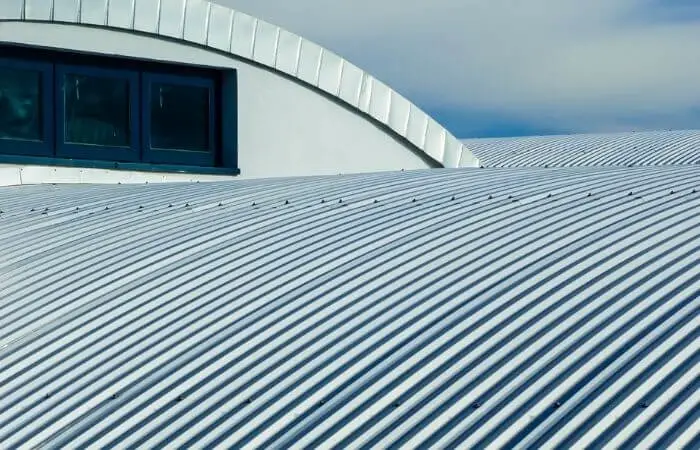
Part of the reason for this is because the metal is rigid with nothing to dampen vibrations and metal is good at allowing vibrations to travel straight through it.
Dampening the roof will soften the impact of raindrops making them sound far quieter.
The best ways to do this are with roofing felt or sound deadening paint:
Roofing Felt
Torch-on bitumen felt is ideal for this sort of project, while self-adhesive or shed felt will work they result in a lower quality finish and are generally thinner so not as good at sound dampening.
Unless you’re experienced with applying roofing felt we recommend you hire a professional for this job.
For maximum soundproofing impact, you should use at least two or three layers.
Sound Deadening Paint
Rubber or latex-based paints are a simple sound deadening solution that is relatively easy to apply to a pre-existing metal roof.
While they are arguably less effective than using roofing felt it is a cheaper solution that doesn’t necessarily require professional help.
Rubber-based paint will help dampen the ringing/tinning noises that metal is prone to making when rain or wind hits it.
For maximum impact you should use at least three layers and ensure each coat you apply is thick.
2. Soundproof The Ceiling
Mass blocks sound, so building a physical barrier between the ceiling and yourself is a guaranteed way of preventing sound from traveling through the roof to you.
If your ceiling is completely uninsulated and you can see the underside of the metal roof then adding a ceiling will have a huge impact.
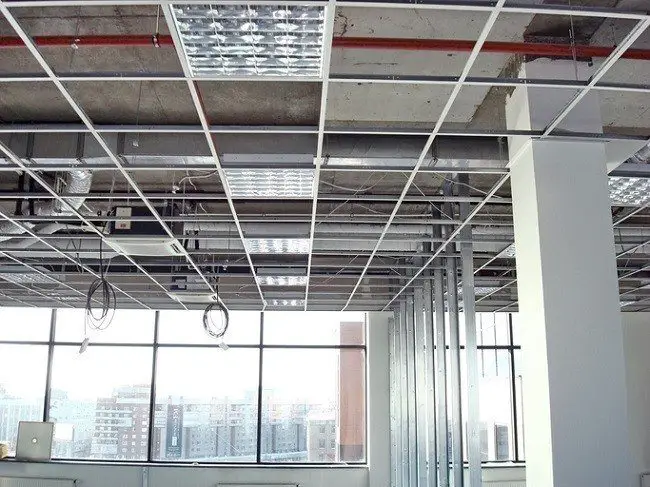
Even if you have a pre-existing ceiling there are still plenty of things you can do to further soundproof it.
Follow these steps:
- If you don’t have a ceiling cavity then you should create a false ceiling.
- Use resilient channels to decouple the ceiling from the roof (these prevent vibrations from traveling into the room).
- Fill the cavity with foam insulating panels such as Rockwool, alternatively you could use spray foam insulation.
- Finish the ceiling with soundproof ceiling tiles.
Read our article on how to soundproof a ceiling for a more in-depth guide.
3. Tighten The Roof Panels
Loosely fitted roof panels will catch wind underneath them and will move and flex in windy conditions.
This will create vibrations and potentially a lot of noise.
Ensuring that all roof panels are tightly secured will drastically diminish the amount of noise your metal roof makes when the weather is windy.
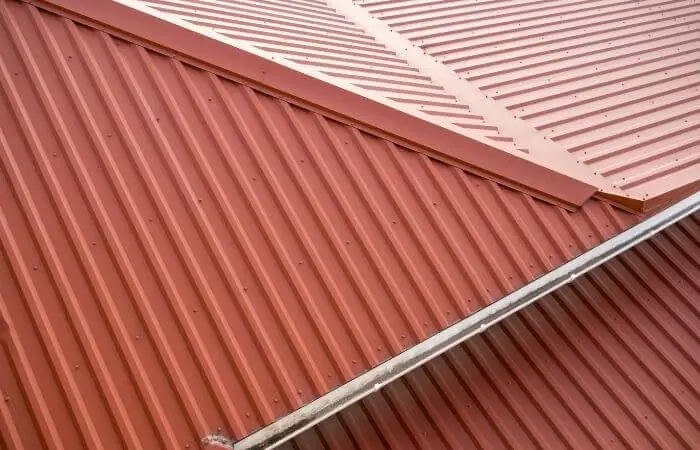
Metal roof panels are fastened into place using roofing screws with washers attached to them.
Every screw should be tightly screwed in.
Loose screws will cause problems, including:
- Allowing water to get underneath the washer, through the screw-hole and into the building.
- Roofing panels will move more when exposed to the wind, this will create a lot of noise.
To fix this all you need to do is get (safely) up onto the roof with a screwdriver and ensure that every screw is properly tightened (as tight as it can be tightened by hand) so that the washers properly seal the roof from moisture penetration and tightly securing the panels in place to minimize noise.
4. Switch Corrugated Metal For Flat Metal
Corrugated metal makes a far noisier roof than more flat metal.
This is due to both the shape and stiffness of corrugated metal.
It catches the wind and it is prone to movement as it isn’t particularly stiff.
This means that it doesn’t hug the roof as closely as stiffer flatter metal roofing does.
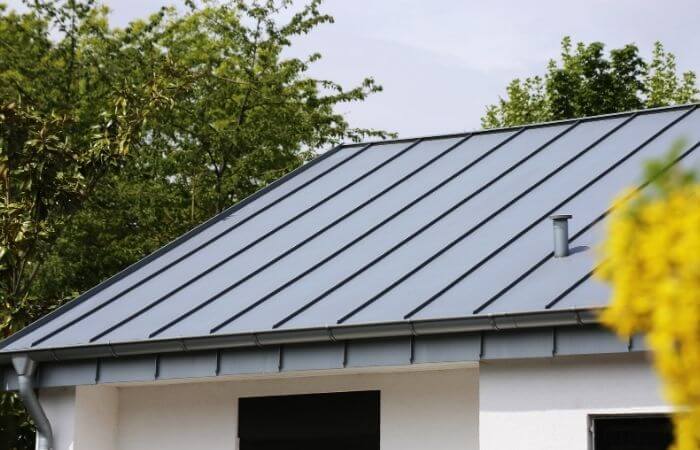
This creates bigger vibrations and a higher noise level.
If your roof uses corrugated metal then switching it for lower profile flat metal roofing will greatly reduce roof noise.
Standing-seam roofing is optimal and is increasingly used in modern house construction projects.
It features panels that run vertically up the roof with seams that tightly clip one panel to the next panel. This creates a very tight-fitting roof that is not prone to vibrations when the weather is bad.
5. Soundproof Underlay
Metal roofs are most prone to making excessive noise when they have not been installed with adequate underlay.
Roof underlayment provides both insulation and, crucially, sound damping between the roofing metal and the rafts of the roof.
This dampens vibrations before they travel into the roofing structure and through the building.
All metal roofs should have roof underlayment fitted beneath the sheeting.
If your roof doesn’t have underlayment installed then adding it will make an enormous difference.
Alternatively swapping the existing underlay out for thicker, denser underlay will also help further dampen roof noise.
About Metal Roofs
Metal roofing has been in use for a long time, lead and copper, in particular, have been used on roofs for centuries.
However it wasn’t until the 18th century when a method for corrugating sheet iron was developed.
This allowed people to make sheet metal stiffer and lighter so that it could cover large areas and was relatively easy to install due to its relative lightness.
This paved the way for metal to be far more widely used in the construction of roofs.
Since then metal roofs have been reinvented numerous times, with plenty of different types of metal roof to choose from.
These include:
- Aluminum
- Copper
- Corrugated Metal
- Metal Tile
- Metal Slate
- Standing Seam Metal
- Steel
- Tin
- Zinc Metal
Typically corrugated metal roofs are thought to be the noisiest due as, if they are not fitted correctly, wind is prone to catching them easily which will therefore create more vibrations.
The truth is metal roof noise is generally a result of panels coming loose over time, or a lack of underlayment.
Corrugated metal roofs are often perceived to be the noisiest because they are cheap to buy install so are frequently used on low budget warehouses that are not properly maintained but allowed to fall into disrepair over the years.
The reality is that none of these metals make for quieter, or noisier roofs, choosing one over the other doesn’t mean you will have less, or more, metal roof noise.
What matters is that your metal roof is installed correctly.
Providing it is fitted with a good underlay and is properly and tightly secured then there is no reason why your roof will not be as quiet as a standard shingle roof or any other quiet roof.
To be sure of a well-soundproofed metal roof make sure you hire a professional roofing contractor.
Are Metal Roofs Actually Noisier In The Rain?
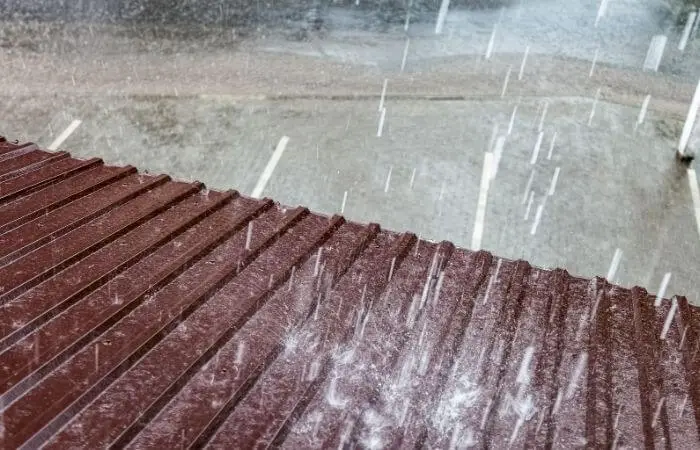
An uninsulated metal roof (think the type that you might find on a standalone warehouse, shed or garage with no false ceiling) will make around 52dB of noise in a heavy rainstorm (“Noise Sources and Their Effects.” Purdue University, Feb. 2000.).
This is not much louder than a quiet conversation being conducted at home and is actually no different from how other roofing types such as asphalt shingles or slate tiles perform.
The reason that it is commonly presumed that metal roofs are noisier is that they are frequently used in warehouse-type spaces with exposed uninsulated ceilings, if you were to fit a shingle roof in the same space without any insulation it would be just as noisy!
As we have already said, providing your metal roof is properly installed then it should be pretty quiet, well insulated against both sound and heat and it should last for decades.
As an Amazon Associate I may earn a small fee from qualifying purchases at no extra cost to you. This helps us run the site, so thanks for your support!
